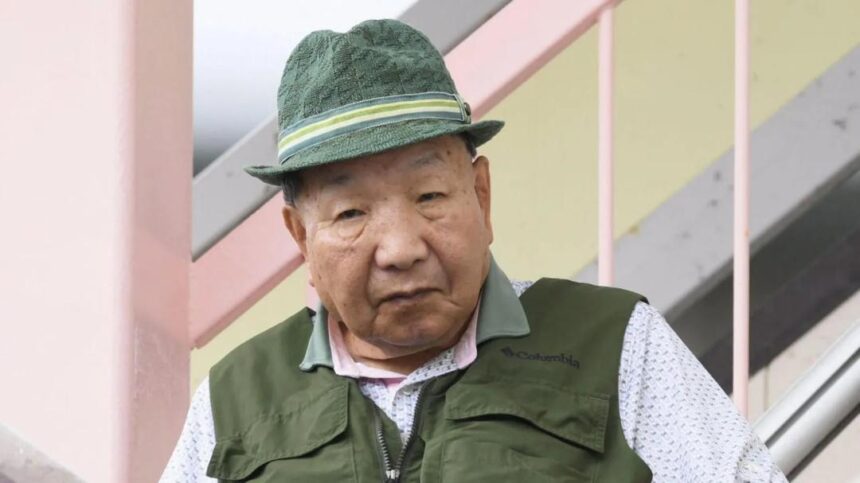By Nakiwala Barbra
World’s Longest-Serving Death Row Inmate Acquitted After 56 Year
Iwao Hakamada, an 88-year-old man who had spent nearly six decades on Japan’s death row, was exonerated by a court after it was determined that the evidence used to convict him was falsified.
Hakamada had been sentenced to death in 1968 for the brutal killings of his employer, his employer’s wife, and their two teenage children. However, after a lengthy retrial, suspicions emerged that evidence might have been planted by investigators, leading to his wrongful conviction for the quadruple homicide.
Hakamada’s prolonged imprisonment, during which he faced the constant threat of execution, severely impacted his mental health. He was unable to attend the hearing where his acquittal was announced, as his condition had deteriorated significantly over the years.
The case, one of Japan’s most notorious and drawn-out legal battles, attracted significant public interest, with hundreds of spectators lining up outside the Shizuoka courtroom. Supporters erupted in cheers as the judge delivered the ruling, shouting “Banzai” in a show of celebration.
Since his release in 2014, Hakamada has lived under the care of his 91-year-old sister, Hideko, who has been a vocal advocate for her brother’s innocence. When the verdict was read, she expressed overwhelming emotion, saying she was moved to tears by hearing the words “not guilty” in court.
“All these years of fighting, it’s like I’ve been in a never-ending battle,” Hakamada had said in a previous interview, reflecting on his struggle for justice.
The Case and Its Controversial Evidence
Hakamada’s legal troubles began in 1966 when he was arrested after the bodies of his employer’s family were discovered in their home, which had been set ablaze. The four victims had been stabbed to death. Authorities accused Hakamada of the crime, claiming he had murdered the family and set fire to their house, allegedly stealing 200,000 yen in the process.
Initially, Hakamada denied any involvement but later recanted, saying he had been coerced into confessing after enduring severe abuse during long interrogations. Despite his retraction, he was convicted of murder and sentenced to death.
For years, Hakamada’s defense team maintained that crucial evidence, notably bloodstained clothing found in a miso tank a year after his arrest, had been fabricated. The prosecution used these clothes to tie him to the crime, but DNA tests later showed that the blood did not match Hakamada’s, suggesting the possibility of planted evidence.
In 2014, Judge Hiroaki Murayama, reviewing the case, noted that the bloodstained garments were not Hakamada’s. He ruled that the evidence could not have been authentic and ordered a retrial. Murayama further stated that it was unjust to continue detaining Hakamada, given the doubts surrounding his conviction.
The retrial, which began years later, ultimately focused on the unusual nature of the blood stains on the clothing, which had remained red even after being submerged in miso for an extended period. The court found that investigators had intentionally stained the clothes with blood, then hidden them in the tank to create a false narrative.
A Long Fight for Justice
The acquittal marks a significant milestone in Hakamada’s prolonged battle for justice, though the mental and emotional toll on him has been immense. His sister, Hideko, who has fought tirelessly for his release, expressed deep relief after the verdict.
“Finally, a weight has been lifted off my shoulders,” she said, reflecting on the decades of effort she dedicated to clearing her brother’s name.
Hakamada’s case is rare in Japan, as retrials for World’s Longest-Serving Death Row Inmate Acquitted After 56 Years
Iwao Hakamada, an 88-year-old man who had spent nearly six decades on Japan’s death row, was exonerated by a court after it was determined that the evidence used to convict him was falsified.
Hakamada had been sentenced to death in 1968 for the brutal killings of his employer, his employer’s wife, and their two teenage children. However, after a lengthy retrial, suspicions emerged that evidence might have been planted by investigators, leading to his wrongful conviction for the quadruple homicide.
Hakamada’s prolonged imprisonment, during which he faced the constant threat of execution, severely impacted his mental health. He was unable to attend the hearing where his acquittal was announced, as his condition had deteriorated significantly over the years.
The case, one of Japan’s most notorious and drawn-out legal battles, attracted significant public interest, with hundreds of spectators lining up outside the Shizuoka courtroom. Supporters erupted in cheers as the judge delivered the ruling, shouting “Banzai” in a show of celebration.
Since his release in 2014, Hakamada has lived under the care of his 91-year-old sister, Hideko, who has been a vocal advocate for her brother’s innocence. When the verdict was read, she expressed overwhelming emotion, saying she was moved to tears by hearing the words “not guilty” in court.
“All these years of fighting, it’s like I’ve been in a never-ending battle,” Hakamada had said in a previous interview, reflecting on his struggle for justice.
The Case and Its Controversial Evidence
Hakamada’s legal troubles began in 1966 when he was arrested after the bodies of his employer’s family were discovered in their home, which had been set ablaze. The four victims had been stabbed to death. Authorities accused Hakamada of the crime, claiming he had murdered the family and set fire to their house, allegedly stealing 200,000 yen in the process.
Initially, Hakamada denied any involvement but later recanted, saying he had been coerced into confessing after enduring severe abuse during long interrogations. Despite his retraction, he was convicted of murder and sentenced to death.
For years, Hakamada’s defense team maintained that crucial evidence, notably bloodstained clothing found in a miso tank a year after his arrest, had been fabricated. The prosecution used these clothes to tie him to the crime, but DNA tests later showed that the blood did not match Hakamada’s, suggesting the possibility of planted evidence.
In 2014, Judge Hiroaki Murayama, reviewing the case, noted that the bloodstained garments were not Hakamada’s. He ruled that the evidence could not have been authentic and ordered a retrial. Murayama further stated that it was unjust to continue detaining Hakamada, given the doubts surrounding his conviction.
The retrial, which began years later, ultimately focused on the unusual nature of the blood stains on the clothing, which had remained red even after being submerged in miso for an extended period. The court found that investigators had intentionally stained the clothes with blood, then hidden them in the tank to create a false narrative.
A Long Fight for Justice
The acquittal marks a significant milestone in Hakamada’s prolonged battle for justice, though the mental and emotional toll on him has been immense. His sister, Hideko, who has fought tirelessly for his release, expressed deep relief after the verdict.
“Finally, a weight has been lifted off my shoulders,” she said, reflecting on the decades of effort she dedicated to clearing her brother’s name.
Hakamada’s case is rare in Japan, as retrials for death row inmates are infrequent. His is only the fifth such retrial in the country’s post-war history. Japan remains one of the few developed nations, alongside the United States, that still enforces the death penalty, with prisoners typically being notified shortly before their execution.
The case of Iwao Hakamada serves as a haunting reminder of the potential for miscarriages of justice, especially in legal systems where the threat of death hangs over the accused for years. row inmates are infrequent. His is only the fifth such retrial in the country’s post-war history. Japan remains one of the few developed nations, alongside the United States, that still enforces the death penalty, with prisoners typically being notified shortly before their execution.
The case of Iwao Hakamada serves as a haunting reminder of the potential for miscarriages of justice, especially in legal systems where the threat of death hangs over the accused for years.







